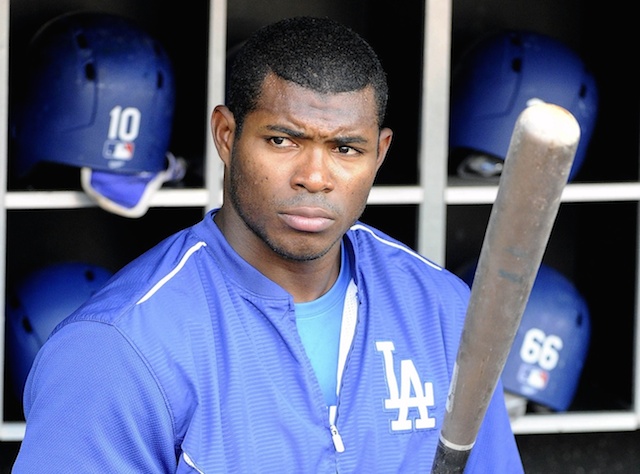Unless you’ve been living under a rock, you’ve certainly heard the back-and-forth surrounding Yasiel Puig in the aftermath of the non-waiver trade deadline. The Los Angeles Dodgers told Puig he was being demoted or traded, and so he “stormed out” according to Ken Rosenthal.
And then, well, actually, he didn’t storm out. (It’s okay, Puig forgave Rosenthal). Regardless of how that conversation went, however, the outcome was the same: Yasiel Puig did not join the Dodgers on their road trip to Denver. But why?
Compared to his rookie season, Puig’s offensive abilities have continued to circle the drain. After posting a .925 on-base-plus slugging percentage in 2013, that number declined to .862 in 2014, .758 in 2015, and .706 this season.
Basically, Puig has gone from one of the game’s best hitters to a below-average one over the course of the past 48 months. But do the Dodgers really have better options? Actually, not really.
Kiké Hernandez and Scott Van Slyke boast an OPS of .630 and .641, respectively. That’s without factoring in Puig’s far superior defense.
So if the Dodgers don’t have better offensive options and they don’t have better defensive options, then why was Puig sent packing in the midst of a divisional race?
Because baseball and its nuances are weird.
In a baseball season, teams will play 162 games in six months — with half of that time spent living out of hotels. Put simply, players spend an inordinate amount of time together.
In football, the season lasts four months, but you’re only on the road around 10 percent of the time. While the percentage is higher in basketball, the number of off-nights makes for a more manageable locker room.
It’s why things like “clubhouse culture” get kicked around so much. Things that aren’t quantifiable, and yet, things most people believe actually matter. It’s why people think San Francisco Giants manager Bruce Bochy has been so successful with (typically) inferior talent.
Ultimately, the Dodgers didn’t decide that Puig was no longer their best No. 3 outfielder, but that the downsides had officially outweighed the upsides.
Somehow, they came to the conclusion that the problems Puig caused in the clubhouse, which, four months into the season have probably worn out the patience of others, were no longer worth the amazing throws and perpetual hope Puig offered at the plate.
For fans, it hurts because Puig has brought more excitement in a few short years than most players will bring in an entire career. It’s easy to fall in love with the excitement Puig brings, and the tenacity with which he plays.
But to pretend to know better than the Dodgers front office as to how Puig is affecting the performance of others would be foolish.
This front office isn’t perfect, but they’ve been pretty darn close thus far (see: Matt Kemp trade, Dee Gordon trade, Hector Olivera trade, Andrew Toles signing, Kenta Maeda signing, etc.). For that reason, I’m going to give them the benefit of the doubt here and trust that they’ve made the right decision.
While the front office definitely hasn’t handled the public relations side of things well in this particular case, it doesn’t mean their decision wasn’t the right one.
And while I’m hopeful Puig isn’t done as a member of the Dodgers, I’ve begun the process of accepting that it could be true. Why?
Well, because baseball is weird.






